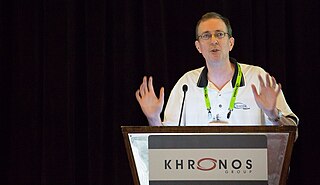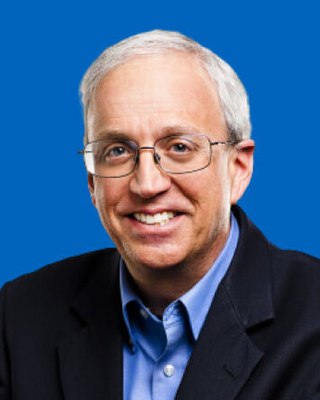Related Research Articles

John Leroy Hennessy is an American computer scientist who is chairperson of Alphabet Inc. (Google). Hennessy is one of the founders of MIPS Technologies and Atheros, and also the tenth President of Stanford University. Hennessy announced that he would step down in the summer of 2016. He was succeeded as president by Marc Tessier-Lavigne. Marc Andreessen called him "the godfather of Silicon Valley."

Jack Joseph Dongarra is an American computer scientist and mathematician. He is a University Distinguished Professor Emeritus of Computer Science in the Electrical Engineering and Computer Science Department at the University of Tennessee. He holds the position of a Distinguished Research Staff member in the Computer Science and Mathematics Division at Oak Ridge National Laboratory, Turing Fellowship in the School of Mathematics at the University of Manchester, and is an adjunct professor and teacher in the Computer Science Department at Rice University. He served as a faculty fellow at the Texas A&M University Institute for Advanced Study (2014–2018). Dongarra is the founding director of the Innovative Computing Laboratory at the University of Tennessee. He was the recipient of the Turing Award in 2021.
General-purpose computing on graphics processing units is the use of a graphics processing unit (GPU), which typically handles computation only for computer graphics, to perform computation in applications traditionally handled by the central processing unit (CPU). The use of multiple video cards in one computer, or large numbers of graphics chips, further parallelizes the already parallel nature of graphics processing.

Charles Eric Leiserson is a computer scientist and professor at Massachusetts Institute of Technology (M.I.T.). He specializes in the theory of parallel computing and distributed computing.

David A. Bader is a Distinguished Professor and Director of the Institute for Data Science at the New Jersey Institute of Technology. Previously, he served as the Chair of the Georgia Institute of Technology School of Computational Science & Engineering, where he was also a founding professor, and the executive director of High-Performance Computing at the Georgia Tech College of Computing. In 2007, he was named the first director of the Sony Toshiba IBM Center of Competence for the Cell Processor at Georgia Tech.

Kurt Akeley is an American computer graphics engineer.

Frances Elizabeth Allen was an American computer scientist and pioneer in the field of optimizing compilers. Allen was the first woman to become an IBM Fellow, and in 2006 became the first woman to win the Turing Award. Her achievements include seminal work in compilers, program optimization, and parallelization. She worked for IBM from 1957 to 2002 and subsequently was a Fellow Emerita.

William James Dally is an American computer scientist and educator. He is the chief scientist and senior vice president at Nvidia and was previously a professor of Electrical Engineering and Computer Science at Stanford University and MIT. Since 2021, he has been a member of the President's Council of Advisors on Science and Technology (PCAST).

Mark A. Horowitz is an American electrical engineer, computer scientist, inventor, and entrepreneur who is the Yahoo! Founders Professor in the School of Engineering and the Fortinet Founders Chair of the Department of Electrical Engineering at Stanford University. He holds a joint appointment in the Electrical Engineering and Computer Science departments and previously served as the Chair of the Electrical Engineering department from 2008 to 2012. He is a co-founder, the former chairman, and the former chief scientist of Rambus Inc.. Horowitz has authored over 700 published conference and research papers and is among the most highly-cited computer architects of all time. He is a prolific inventor and holds 374 patents as of 2023.
David E. Keyes is a Senior Associate to the President of King Abdullah University of Science and Technology (KAUST) and the Director of the Extreme Computing Center at King Abdullah University of Science and Technology (KAUST). He was the inaugural Dean of the Division of Computer, Electrical, and Mathematical Sciences and Engineering (CEMSE) at KAUST and remains an adjunct professor in Applied Physics and Applied Mathematics at Columbia University and an affiliate of several laboratories of the U.S. Department of Energy. With backgrounds in engineering, applied mathematics, and computer science, he works at the algorithmic interface between parallel computing and the numerical analysis of partial differential equations, across a spectrum of aerodynamic, geophysical, and chemically reacting flows.
Krishna V. Palem is a computer scientist and engineer of Indian origin and is the Kenneth and Audrey Kennedy Professor of Computing at Rice University and the director of Institute for Sustainable Nanoelectronics (ISNE) at Nanyang Technological University (NTU). He is recognized for his "pioneering contributions to the algorithmic, compilation, and architectural foundations of embedded computing", as stated in the citation of his 2009 Wallace McDowell Award, the "highest technical award made solely by the IEEE Computer Society".

Cynthia Dwork is an American computer scientist best known for her contributions to cryptography, distributed computing, and algorithmic fairness. She is one of the inventors of differential privacy and proof-of-work.
Fred Barry Schneider is an American computer scientist, based at Cornell University, where he is the Samuel B. Eckert Professor of Computer Science. He has published in numerous areas including science policy, cybersecurity, and distributed systems. His research is in the area of concurrent and distributed systems for high-integrity and mission-critical applications.
Dinesh Manocha is an Indian-American computer scientist and the Paul Chrisman Iribe Professor of Computer Science at University of Maryland College Park, formerly at University of North Carolina at Chapel Hill. His research interests are in scientific computation, robotics, self-driving cars, affective computing, virtual and augmented reality and 3D computer graphics.

Oyekunle Ayinde "Kunle" Olukotun is a British-born Nigerian computer scientist who is the Cadence Design Systems Professor of the Stanford School of Engineering, Professor of Electrical Engineering and Computer Science at Stanford University and the director of the Stanford Pervasive Parallelism Lab. Olukotun is known as the “father of the multi-core processor”, and the leader of the Stanford Hydra Chip Multiprocessor research project. Olukotun's achievements include designing the first general-purpose multi-core CPU, innovating single-chip multiprocessor and multi-threaded processor design, and pioneering multicore CPUs and GPUs, transactional memory technology and domain-specific languages programming models. Olukotun's research interests include computer architecture, parallel programming environments and scalable parallel systems, domain specific languages and high-level compilers.
Munindar P. Singh is a SAS institute distinguished professor and a full professor in the Department of Computer Science at North Carolina State University. Singh is an IEEE Fellow, a AAAI Fellow, a AAAS Fellow, an ACM Fellow, a Member of Academia Europaea, and a ACM SIGAI Autonomous Agents Research Award recipient.
Nancy Marie Amato is an American computer scientist noted for her research on the algorithmic foundations of motion planning, computational biology, computational geometry and parallel computing. Amato is the Abel Bliss Professor of Engineering and Head of the Department of Computer Science at the University of Illinois at Urbana-Champaign. Amato is noted for her leadership in broadening participation in computing, and is currently a member of the steering committee of CRA-WP, of which she has been a member of the board since 2000.

Prabhat Mishra is a Professor in the Department of Computer and Information Science and Engineering at the University of Florida. Prof. Mishra's research interests are in hardware security, quantum computing, embedded systems, system-on-chip validation, formal verification, and machine learning.
Krishnendu Chakrabarty is an Indian-American electrical and computer engineer. He is the Fulton Professor of Microelectronics at Arizona State University Ira A. Fulton Schools of Engineering. Before joining Arizona State, he was the John Cocke Distinguished Professor and was the Chair of the Department of Electrical and Computer Engineering at Duke University Pratt School of Engineering.
Hyesoon Kim is a South Korean-American computer engineer and professor specializing in computer architecture, especially involving graphics processing units and their incorporation into heterogeneous computing systems. She is a professor in the Georgia Tech School of Computer Science, where she heads the High Performance Architecture Lab.
References
- ↑ "Directory". ece.ucdavis.edu. Archived from the original on 2021-11-17. Retrieved 2021-12-30.
- ↑ John D. Owens at the Mathematics Genealogy Project
- ↑ 2022 NEWLY ELEVATED FELLOWS (PDF), November 22, 2022, archived from the original (PDF) on November 24, 2021, retrieved 2021-11-24
- ↑ AAAS Announces Leading Scientists Elected 2020 Fellows, November 24, 2020, retrieved 2021-12-30
- ↑ "Graphics Hardware 2007". www.graphicshardware.org. Archived from the original on 2017-03-19. Retrieved 2021-12-30.